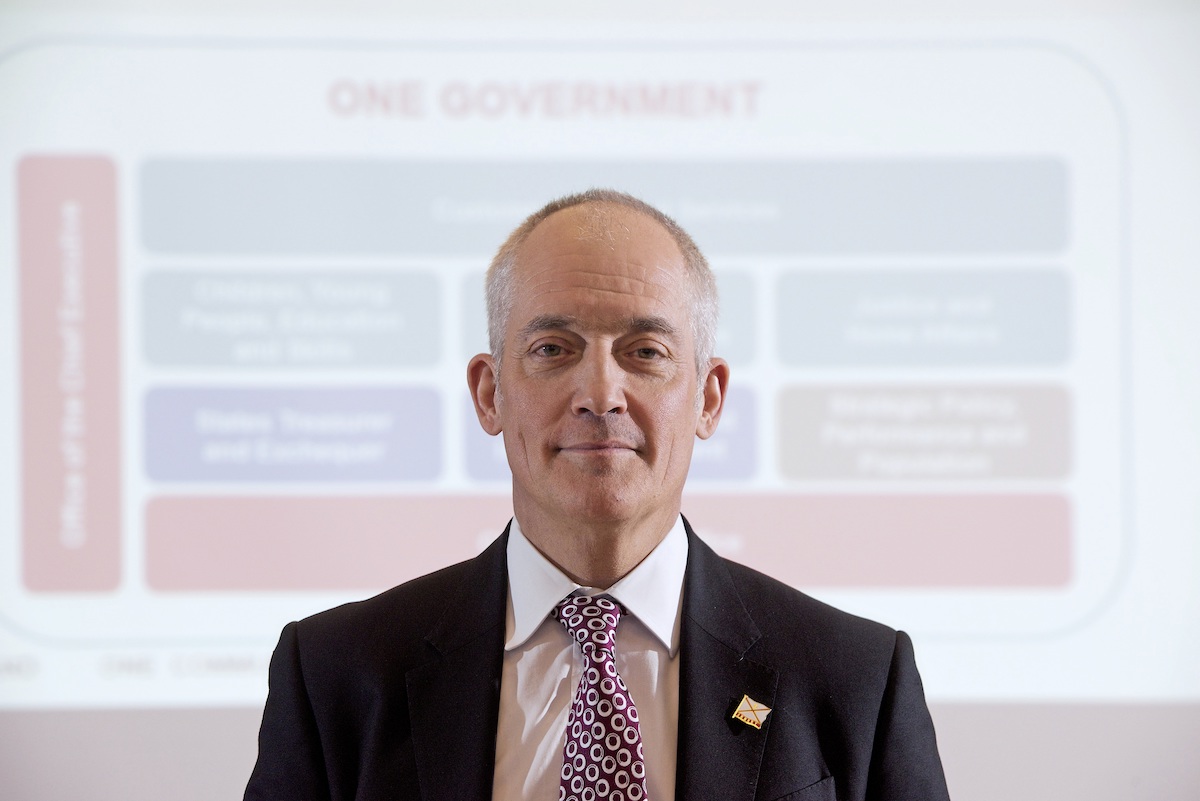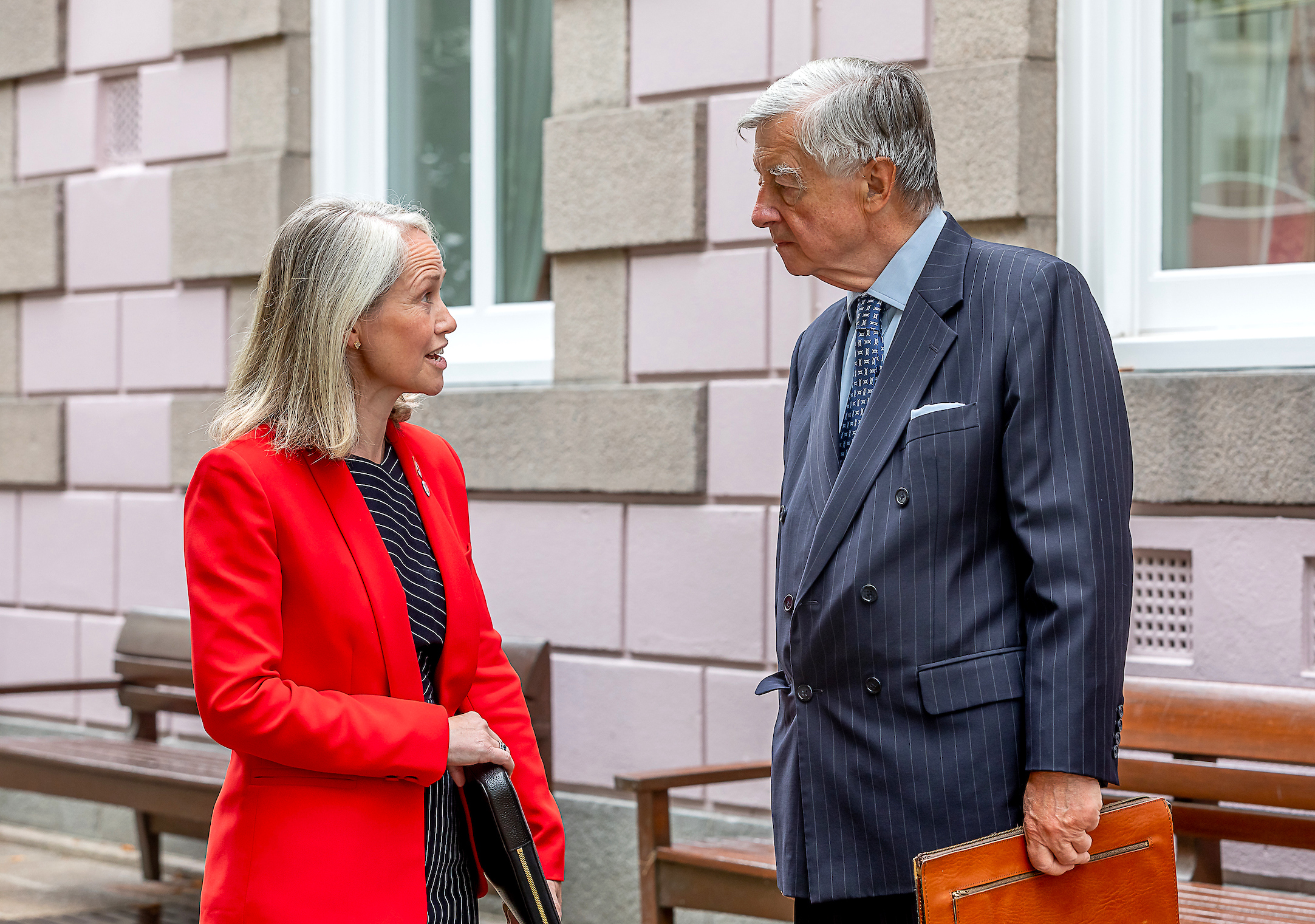


In a statement earlier this week, the Chief Minister revealed work was underway to “assess the role of the CEO going forward” following the resignation of Suzanne Wylie... but what does that actually mean for the island's top civil service position?
Indeed, in her own resignation letter, Mrs Wylie wrote: “There is much political debate on the role of the CEO and my departure will also open the opportunity to assess if it should be changed and to what degree.”
There has been much speculation over what prompted Mrs Wylie to hand in her notice after 13 months but it is clear that the CEO’s role and responsibilities were a topic of much discussion at the political top table.
Express explores...
Since 2018, the CEO has been the ‘Principal Accounting Officer’ - a role defined under the Public Finances Law.
Although the POA is not responsible for making policy decisions - this responsibility lies with the Government of Jersey, Council of Ministers and Ministers – he or she is accountable for the implementation of policy “with due regard for the need to achieve value for money and good governance”.
The POA is also responsible for the appointment of Accountable Officers - in other words, deciding who should be ultimately responsible for delivering what and, if something goes wrong, whose neck is on the line. They may also remove an Accountable Officer from their role.
The changes to the role of CEO were implemented following the appointment of Charlie Parker, who said he needed more powers to implement his OneGov structural reforms.
However, there had been previous calls for an end to the ‘silo mentality’ in Government, which previously made Chief Officers legally responsible for their own department.

Pictured: Former Government CEO Charlie Parker was given enhanced powers of responsibility early in 2018.
The Independent Care Commission and a review of the much-criticised Jersey Innovation Fund had both identified a lack of joined-up thinking and called for a simpler decision-making process.
Although States Members generally agreed that it was right that the CEO should be ultimately responsible for running the civil service, there were concerns about the consolidation of power in the hands of one person.
At the time of a big vote called 'P1' on what is known as the 'Machinery of Government', former Bailiff, Minister and Senator Sir Philip Bailhache, expressed serious misgivings about the speed of such a significant change, saying that it was being debated with “unseemly haste”.
He suggested that some States Members may have been “bewitched” - as he initially was - by Mr Parker’s “splendid presentation” on his proposed reorganisation of the civil service.
Countering the view of then Chief Minister Ian Gorst that such changes would “ensure clearer governance, more transparent decision-making and stronger accountability at the top of the public service”, now-Deputy Bailhache felt that the proposal muddied the lines of accountability and concentrated power in the hands of too few.
“The introduction of the Principal Accountable Officer and the interposition of the PAO between a Minister and his Chief Officer, involve a huge shift in departmental relations,” he said at the time.
“No man can serve two masters, and the constitution of the PAO, desirable as it may be for other reasons, comes close to creating this classically undesirable division of accountability. It will require diplomacy and sensitivity on the part of Ministers, their Chief Officers, and the PAO to find the right balance so as to ensure harmonious working relationships.”
Although ‘P1’ – the proposal in 2018 – also proposed making the Government a ‘single legal entity’, this has never been implemented.
Sir Philip was not the only one voicing concerns about P1, especially as an important check – a law setting out disciplinary procedures for officials, including the CEO – was nowhere to be seen.
Deputy Kirsten Kirsten Morel warned at the time: “One of the biggest concerns I have had from the public is about this centralisation of power into one unelected person. That has come through from all sorts of different members of the public and they are looking to us to ensure that the Chief Executive can be held to account.
“…I do worry [parts of the Public Finances Law will] move further towards this culture where us, as democratically elected Members, are rendered impotent and an unelected Chief Executive is rendered all potent, so to speak.”
Will these concerns about the accountability of the CEO and the overall structure of Government enduring, the committee in charge of the running of the Assembly set up an ad hoc committee to look at ‘democratic accountability and governance’ in February 2021.
Chaired by former Education Minister Tracey Vallois and including current ministers Deputies Gorst and Kirsten Morel on the sub-committee, it published its findings last February.
A key proposal was the creation of a Cabinet Office which would merge the Ministerial Support Unit - the team responsible for helping Ministers with their duties - and the Strategic Policy, Planning and Performance Department - the group of civil servants responsible for forward-looking and drafting up strategies to steer the island through different challenges - to better support Ministers.
It also concluded that there was an “imbalance of power between the Chief Executive / Civil Service and the States of Jersey, which leads to a lack of political accountability for decisions”.
Also: “Some departments do not have a single minister with political responsibility, which leads to a lack of clarity and accountability” and “there are blurred lines of accountability between executive and non-executive responsibilities.”
Last April, States Members backed a formal proposal from then-Environment Minister John Young to “ensure that each department has one minister who is ultimately accountable for all aspects of the work of that department”.
The proposition also requested that the Chief Minister review ministerial portfolios within six months of the 22 June election.
Swept into power last summer, Chief Minister Kristina Moore took up the sub-committee’s recommendations and created a Cabinet Office as part of her ‘100-day’ plan.
In one of her earliest interviews at Chief Minister, she pledged to pick up Mr Young’s proposition to directly link Ministers to departments and reconsider the powers of the CEO.
The creation of the Cabinet Office, led by the CEO with support from two Assistant Chief Executives: Treasurer Richard Bell, and Tom Walker, Director General for SPPP, was set up last year.
It combined the Office of the Chief Executive (led, obviously, by the CEO), the Chief Operating Office (led by COO John Quinn), as well as ‘S-Triple-P’.
A Ministerial Decision explained that, over the new structure’s first 12 months, “the Chief Executive Office will, in discussion with the Chief Minister, develop the roles, responsibilities, and organisation of the Cabinet Office to deliver an enhanced emphasis on delivery and improvement across the public service.
“This will include an enhanced function to drive forward delivery of Council of Minister’s priorities, in particular those projects that are cross-cutting and require a dedicated level of focus to get them ready to deliver.”
In January, COO John Quinn left after taking voluntary redundancy, and two months later, CEO Suzanne Wylie announced her own shock resignation.
So, is there something fundamentally wrong with the structure at the top of Government?
Sir Philip is clear in his opinion that the new Cabinet Office is currently unsustainable and needs reform.
He said: “In my view, it is not so much the job but more the structure in which the Chief Executive operates.
"The Cabinet Office as a structure puts the Chief Executive in an impossible situation."

Pictured: Chief Minister Kristina Moore and States Employment Board member Deputy Philip Bailhache.
He continued: “There are too many people directly reporting to her and, within the Cabinet Office, there are too many officials who do not have direct access to a minister.
“It runs contrary to the successful proposition from John Young, which the States agreed last year, which has not been implemented, although I recognise that P1 is not an easy thing to pick apart.”
In added: “In my view, it would be a mistake to rush to appoint a new CEO before the structure under them has been sorted out. If it is not reformed, we will find ourselves in exactly the same position we are in now.
“In short, there are too many officials reporting to the CEO and too few officials not directly reporting to a minister.”
Reflecting on his concerns about P1, Sir Philip, who is a member of the States Employment Board, said: “In 2018, I was not opposed to the CEO becoming the Principal Accounting Officer, and ensuring that the CEO has some authority of their top civil servants, but I thought such a substantial change should be allowed to bed in before making more changes. And that is still my view.
“In my opinion, it is much better to have had a relatively small office around the CEO and Chief Minister, because part of the job of the CEO is to give strategic advice to the Chief Minister and Council of Ministers.
“And that requires a bit of space around the CEO. They cannot be up to their eyes in the sort of responsibilities which Mrs Wylie currently has. I have thought the position was unsustainable for some time, and it seems that has been the case.”
As well as the structure, the Chief Minister and outgoing CEO may want to endeavour to influence the culture in the civil service too.
She has already intimated that it might be appropriate to have someone who already knows the organisation and island to provide “stability”.
Taking previous views into account, there may be efforts to elevate the position of the Chief Minister and Council of Ministers vis-à-vis the CEO by strengthening links between individual ministers and their Chief Officers. This may, in turn, give the CEO the 'space' which the current incumbent is perceived to be lacking.
Whatever the outcome, Deputy Moore will surely be hopeful that the next top civil servant – who will be the Government’s fourth in as many years – will stay for longer than their immediate predecessors.
Comments
Comments on this story express the views of the commentator only, not Bailiwick Publishing. We are unable to guarantee the accuracy of any of those comments.